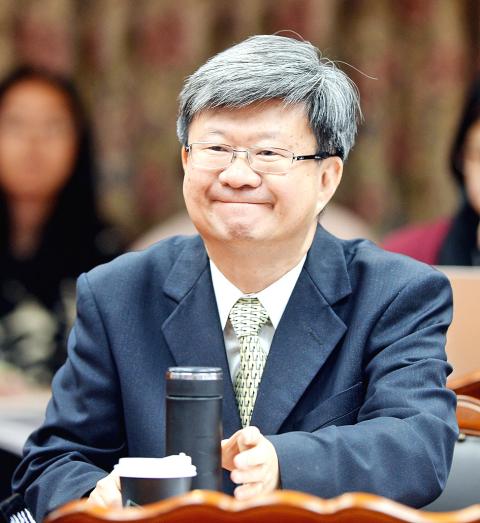Minister of Education Wu Se-hwa (吳思華) yesterday admitted there were lapses in the system the ministry uses to monitor the finances of educational foundations constituted as legal persons, saying there is no mechanism in place to verify possible collusion between the foundations and their donors to prevent misappropriation of funds.
Wu made the remarks during a meeting of the legislature’s Education and Culture Committee in response to Democratic Progressive Party Legislator Huang Kuo-shu’s (黃國書) questions about a tax evasion case involving more than 250 professors and doctors.
The Taipei District Prosecutors’ Office yesterday granted probation to 225 suspects — doctors and medical school professors — who pleaded guilty to tax evasion, while indicting 26 who denied the allegations.

Photo: Lin Cheng-kung, Taipei Times
When Huang asked Wu whether Springsoft Education Foundation was a legal person registered with the ministry, Wu said: “Yes.”
The foundation was founded by former National Defense Medical Center director Tsai Tso-yung (蔡作雍) and used by Tsai to help the suspects evade taxes by making forged donations in exchange for research funds, Huang said.
Huang then cited the enforcement rules on the ministry’s duties to review the application process concerning the establishment of education foundations and to monitor their operations, which stipulate that the ministry is obligated to check the finances of education foundations during appraisals.
When asked whether the ministry regularly inspected the Springsoft Education Foundation, Wu said the foundation was last checked in 2011 and no irregularities were found in its finances based on the balance sheets it submitted.
“Donations were not the problem and neither was the application for research funds. The problem is that the donors were also the beneficiaries… This was not shown in past documents,” Wu said.
Wu said the ministry would improve the system to monitor educational foundations and launch a probe into foundations that have been accused of similar malpractice, adding that the ministry would need to upgrade its information technology to ascertain the relationship between the foundations and their benefactors.
He said the ministry would obtain a better understanding of the tax evasion case and punish Springsoft employees involved in no more than two months.
Meanwhile, Wu yesterday was adamant about a merger espoused by the ministry between Tainan National University of the Arts (TNNUA) and National Cheng Kung University (NCKU).
The proposed merger has angered many TNNUA students, who protested in front of the ministry on Monday, saying the move could hamper their studies.
Wu said the TNNUA has fared poorly in university appraisals in recent years and that it is encountering difficulty recruiting students.
“If the two schools do not merge, where is the future of TNNUA?” he asked, adding that it would benefit the TNNUA if the two schools merge.

Taiwan has received more than US$70 million in royalties as of the end of last year from developing the F-16V jet as countries worldwide purchase or upgrade to this popular model, government and military officials said on Saturday. Taiwan funded the development of the F-16V jet and ended up the sole investor as other countries withdrew from the program. Now the F-16V is increasingly popular and countries must pay Taiwan a percentage in royalties when they purchase new F-16V aircraft or upgrade older F-16 models. The next five years are expected to be the peak for these royalties, with Taiwan potentially earning

STAY IN YOUR LANE: As the US and Israel attack Iran, the ministry has warned China not to overstep by including Taiwanese citizens in its evacuation orders The Ministry of Foreign Affairs (MOFA) yesterday rebuked a statement by China’s embassy in Israel that it would evacuate Taiwanese holders of Chinese travel documents from Israel amid the latter’s escalating conflict with Iran. Tensions have risen across the Middle East in the wake of US and Israeli airstrikes on Iran beginning Saturday. China subsequently issued an evacuation notice for its citizens. In a news release, the Chinese embassy in Israel said holders of “Taiwan compatriot permits (台胞證)” issued to Taiwanese nationals by Chinese authorities for travel to China — could register for evacuation to Egypt. In Taipei, the ministry yesterday said Taiwan

Taiwan is awaiting official notification from the US regarding the status of the Agreement on Reciprocal Trade (ART) after the US Supreme Court ruled US President Donald Trump's global tariffs unconstitutional. Speaking to reporters before a legislative hearing today, Premier Cho Jung-tai (卓榮泰) said that Taiwan's negotiation team remains focused on ensuring that the bilateral trade deal remains intact despite the legal challenge to Trump's tariff policy. "The US has pledged to notify its trade partners once the subsequent administrative and legal processes are finalized, and that certainly includes Taiwan," Cho said when asked about opposition parties’ doubts that the ART was

If China chose to invade Taiwan tomorrow, it would only have to sever three undersea fiber-optic cable clusters to cause a data blackout, Jason Hsu (許毓仁), a senior fellow at the Hudson Institute and former Chinese Nationalist Party (KMT) legislator, told a US security panel yesterday. In a Taiwan contingency, cable disruption would be one of the earliest preinvasion actions and the signal that escalation had begun, he said, adding that Taiwan’s current cable repair capabilities are insufficient. The US-China Economic and Security Review Commission (USCC) yesterday held a hearing on US-China Competition Under the Sea, with Hsu speaking on